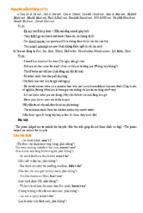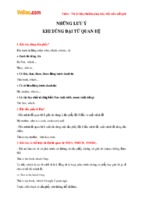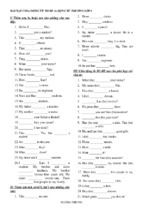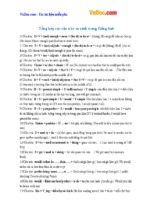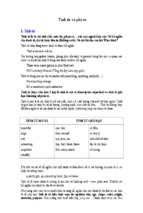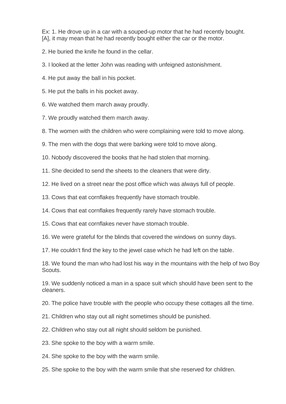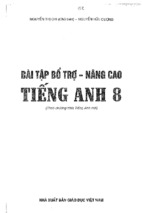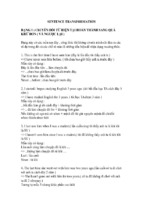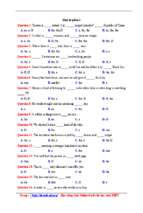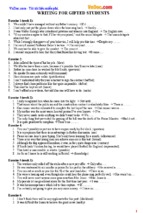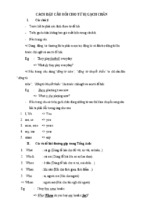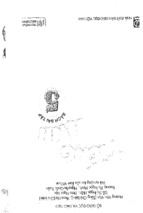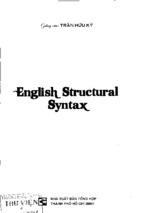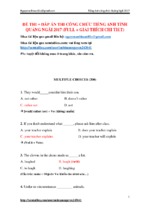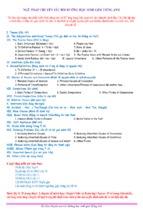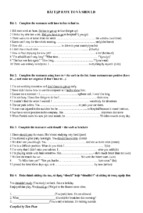Mô tả:
I. TENSE:
Past simple
Started/began
Present perfect
has done/has been doing
She last wrote to me 6 months ago.
She hasn’t written to me for 6 months.
I haven’t been to the cinema for 20 years.
The last time I went to the cinema was 20 years ago.
Or: I last went to the cinema 20 years ago.
The last time it rained here was a fortnight ago.
It hasn’t rained here for a fornight.
It started raining last Saturday, and it haven’t stopped yet.
It has been raining since last Saturday.
He began working for the local newspaper right after his graduation.
He has been working for the local newspaper since his graduation.
When did you start working here?
How long have you been working here?
They last had a holiday in the mountain when they visited their
grandparents.
They haven’t had a holiday in the mountain since they visited their
grandparents.
The last time it snowed here was 40 years ago.
It hasn’t snowed here for 40 years.
I haven't been abroard for 2 years now.
I last went abroard for 2 years
They started to investigate the case three months ago.
They have been investigating the case for three months.
They haven't visited me for 5 years.
They last visited me 5 years ago.
She started working for the company in 2000.
She has been working for the company since 2000.
II. Active – Passive:
1. Present siple: CN + am/is/are + P2
2. Past simple: CN + was/were + P2
3. Prog present: CN + am/is/are + being +P2.
4. Past Prog simple: CN + was/were + being +P2.
5. Perfect simple: CN+have/has + been + P2
6. Past perfect: CN + had been + P2.
7. CN + must/ might/ can/will/have to/be going to/want to + be + P2
The fire has destroyed many houses in the area.
Many houses have been destroyed in the area by the fire.
They don’t allow smoking in many public places.
Smoking is not allowed in many public places.
They will have to cancel the picnic.
The picnic will have to be cancelled.
They are installing the alarm system.
The alarm system is being installed.
The restaurant is closed because they are redecorating it
The restaurant is closed because it is being redecorated.
Man continues to take minerals from the earth in immense quantities.
Minerals continue to be taken from the earth in immense quantities
They have awarded the best student a scholarship.
The best student has been awarded a scholarship.
You should take 2 tablets every 6 hours.
Two tablets should be taken every 6 hours.
A police is questioning a man in connection with the robbery.
A man in connection with the robbery is being questioned by a police.
We have to pay the bills before the tenth of the month.
The bills have to be paid before the tenth of the month.
We must do something to save the situation before it is too late.
Something must be done to save the situation before it is too late.
III. Verb patterns and structures:
To take (sbd) + Time + to do sth: mat bao nhieu thoi gian de lam gi
To apologize (to sbd) + for + doing sth/ not doing sth: xin loi vi da lam gi day
Would you mind + doing sth : Ban ko cho muon
The flight from Hanoi to Sydney lasted 8 hours.
It took 8 hours to fly from Hanoi to Sydney.
May I borrow your pen?
Would you mind lending me your pen?
The train journey from London to Bristol takes two hours.
It is a two-hour train journey from London to Bristol
I can’t afford to go on holiday this year.
I haven’t enough money to go on holiday this year.
We spent three hours getting to Beijing by air.
It took us 3 hours to get to Beijing by air.
These old men can't be made to change.
It is imposible to change these old men.
Do you have a good relationship with your boss?
Are you getting on well with your boss?
The flight from HN to Sydney lasted 8 hours.
It took 8 hours to fly from HN to Sydney.
‘I’m sory. I gave you the wrong number’, said Paul to Susan.
Paul apologized to Susan for giving her the wrong number.
May I borrow your pen?
Would you mind lending me your pen
The train journey from LD to Bristol takes two hours.
It’s a two hours train journey from LD to Bristol
IV. Adverbial Clause:
1. Not only + verb/ adv/adj + but also + ver/adv/adj. ( không những
……..mà còn).
2. Both + verb/adv/adj + And + verb/adv/adj
Neither + verb/adv/adj + Nor + verb/adv/adj
Eithr + verb/adv/adj + Or + verb/adv/adj
3. verb/adv/adj + as well as + verb/adv/adj (….. cũng như …..)
4. Despite/ Inspite of + Noun phrase + Clause (mac du)
5. Although/ Even though/ Though + Clause
6. CL1 + so that/ in oder that + CL2
- nếu verb 1 là present simple thì CL2 : CN + can/will/may + verb
infnitive.
- Nếu verb 1 là past simple thì CL2 : CN + could/might/would + Verb
infinitive.
* Because + CL
* Because of / Due to + noun/ noun phrase.
* CL1 + due to the fact that + CL2.
*CL1 + so + adv/adj + that CL2.
*CL1 + such + adj +N+ that +CL2.
* adv/adj + Enough
*Enough + noun
The noise was so loud that I opened the door and locked out.
It was such a loud noise that I opened the door and locked out.
We had to wait for so long that we got fed up and left.
We had to wait for such a long time that we got fed up and left.
The remark was so unexpected that she didn't know what to say.
It was such an unexpected remark that she didn't know what to say.
We couldn’t go out because the weather was so bad.
It was such bad weather that we couldn’t go out.
The little boy crossed the street although the traffic was heavy.
Despite the heavy traffic, the little boy crossed the street.
Although he had to pay high tax, he didn’t complain.
In spite of having to pay high tax, he didn’t complain.
Although he has to work hard, he loves his job
In spite of having to work hard, he loves his job.
Although we are well-prepared for the exam, we feel nervous.
Despite well-preparing for the exam, we feel nervous.
V. Conditionals:
1. loai 1 : if + Present simple, future simple.
2. Loai 2: If + past simple/were , CN + would/ wouldn’t + verb infinitive.
3. Loai 3: If + CN + had/hadn’t + P2, CN + would/wouldn’t + have + P2
Nếu verb ở câu đã cho ở hiện tại thì khi chuyển đổi ta dùng câu loại 2.
còn nếu verb ở cây đã cho ở quá khứ khi chuyển câu ta dùng câu loại 3.
They don’t understand the prolem. They can’t find a solution.
If they understood the problem, they would/could find a solution.
She wrote her composition carelessly, so she got a bad mark.
If she hadn’t written her composition carelessly, she wouldn’t have got a
bad mark.
We arrived at the station too late to catch the last train.
If we hadn’t arrived at the station too late, we would have caught the last
train
We got lost because we didn’t have a map.
If had had a map, we wouldn’t have got lost.
These people came to the meeting late because their car broke down.
If these people's car hadn't broken down, they wouldn't have come to the
meeting late.
He lives so far away so I can't see him very often.
If he didn't live so far away, I could see him very often
VI. Reported speech:
* to order/to ask/ to tell/to say/ to told + sbd + to do sth/not to do sth
* cau hoi gian tiep
CN + asked + O + if + CN (phai bien doi) + verb(lui thi: present thanh
past, past thanh past perfect)
Who/ what/where + nhu tren
‘ Did you phone me yesterday?’ Mary asked Tom.
Mary asked Tom if he had phoned her the day before.
‘When did you leave school?’ Ann asked Phillip.
Ann asked Phillip when he had left school.
‘Don’t believe everything you hear’ she told me.
She told me not to belive everything I heard.
“John, please don’t tell anyone my address”, said Mary.
Mary asked John not to tell anyone her address.
“I’m sorry. I gave you the wrong number”, said Paul to Susan.
Paul apologize for giving Susan the wrong number.
‘Are you sorry for what you did?’ the mother asked the little girl.
The mother asked the little girl if she was sorry for what she had done.
The driver said 'Don't get off the bus while it is moving'.
The driver asked the passenger not to get off the bus while it was
moving.
“Do you know what time the concert starts, Mary?' Bill asked.
Bill asked Mary if she knew what time the concert started.
“How many students are there in your class?”
The teacher asked me how many students there were in my class.
Comparison:
They understand more than we do.
We don’t understand as much as they do.
George is not as energetic as he used to be.
George used to be more energetic than he is now.
She knows more about it than I do.
I don’t know about it as much as her/ she does.
Liz can play the piano better than Hellen.
Hellen can't the piano as well as Liz.
Jack doesn’t play tennis as well as he used to.
Jack used to play tennis better than he now.
- Xem thêm -


